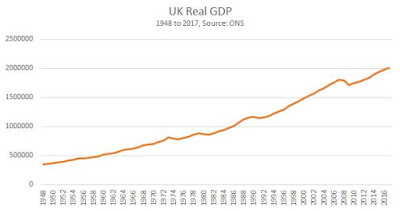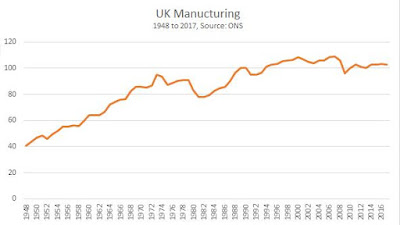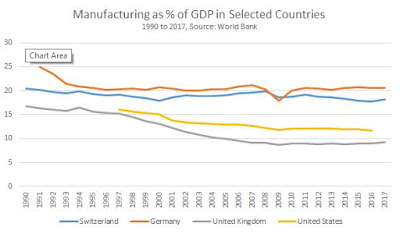By Tom O’Leary
The multi-faceted attack on Jeremy Corbyn’s leadership of the Labour Party continues to include unjustified attacks on his economic policy. The liberal press, led by The Guardian and The Independent mounted a completely specious attack on his economic policy, even claiming that he was adopting the economic nationalism of Donald Trump.
Anyone who read the speech would know this is untrue. Instead, Corbyn was offering a sharp critique of the ruling economic ideology, which has for decades argued that finance and banking was the key to prosperity. “We’ve been told that it’s good, even advanced, for our country to manufacture less and less and to rely instead on cheap labour abroad to produce imports while we focus on the City of London and the financial sector,” Corbyn said.
But advocates of that economic model Britain, which has effectively adopted since Margaret Thatcher in the 1980s, also hit back. Because of the crash, their overt rallying cry cannot be to subordinate everything to the banks and the finance sector, which was Thatcher’s rallying call. Instead, it is to downplay the role of manufacturing and deride any attempt to revive it. It is also claimed that services are much more important. As banking, finance and their related services such as financial accounting, financial law and so on, are the largest, most profitable parts of the services sector, it is easy to see that this is the Thatcherite argument in a new, less open form.
The verdict of history
The verdict is clear. In the 30 years prior to Thatcher UK GDP rose by 145%. In the 30 years including her tenure and subsequently the economy grew by just 114%.
Far from reversing the relative decline of the British economy, the Thatcherite model accelerated it.
Why manufacturing matters
The Thatcherite, or neoliberal argument against manufacturing is that it is old-fashioned and outdated. Modern economies, it is argued are increasingly based on services.
The greater output of manufacturing as compared to services sectors allows both greater reinvestment and higher pay. Crucially, manufacturing outputs are also the inputs for a host of other sectors, including energy, construction and many service sectors themselves, including transport, storage, communications and distribution. A weak manufacturing sector hampers the ability to develop all these other sectors.
This is nothing to do with economic nationalism. On the contrary, as an advanced industrialised economy, the manufacturing sector in Britain is one of the sectors most integrated with the world economy. It is often an important link in a Europe-wide or even global supply chains. To take the car industry, about one-third of all inputs to the British car industry are imports. At the same time, almost 80% of all cars produced here are for export, and 55% of all engines manufactured here are for export.
The complexity of these supply chains and the interconnection of markets can be highlighted in the following way: In 2016 the top 5 UK goods imports were all manufactures, electrical machinery, mechanical machinery, cars, ‘other manufactures’ and medicinal and pharmaceutical goods. Together they accounted for 42.9% of all imports and amounted to £185 billion. They are almost mirrored by the top 5 goods exports of mechanical machinery, cars, electrical machinery, medicines and pharmaceutical goods and aircraft, which together accounted for 45.4% of all exports and amounted to £132 billion.
It is not the case that British Minis are being sold Germany, while German BMWs are being sold here. The reality is that components of both are researched, designed, tested and manufactured in both countries, and many more besides. The value added per British car worker is almost £100,000 per annum, which as far greater than the UK workforce as a whole (by more than 50%). A decisive element of the high value-added is this integration in highly specialised multinational supply chains.
Participation in the international socialisation of production/division of labour is decisive for the development of the economy, on which prosperity depends. Anything that develops manufacturing, one of the sectors most linked to the world economy, will enhance that process, which is what Jeremy Corbyn proposes to do. By the same token, anything that blocks or interrupts the economy’s links to the rest of the world will also hit manufacturing hard.





Recent Comments